
Engaging Hearts and Minds in a Broken Culture
This discussion offers a preview of Volume #16 “Cultures in Conflict” from the That The World May Know video series, available below.
Home » Episodes » Focus on the Family Broadcast » Screen Time: Less is More
John Fuller: Today, Jonathan McKee shares ideas about connection and how that is influenced by all of the screens we use in our lives.
Jonathan McKee: But let’s just be honest. We haven’t figured this thing out. This is a great tool for connecting people outside the room, but we’re learning that it kind of interferes with our relationship with the people inside the room.
John: Welcome to Focus on the Family with your host, Focus president and author, Jim Daly, and I’m John Fuller.
Jim Daly: Well Jonathan McKee always has a lot of insight to share when it comes to media and its impact on the family, and today is no exception. Jonathan is a social researcher, a popular speaker, and an author of many books, including Parenting Generation Screen: Guiding Your Kids to be Wise in a Digital World, published by Focus on the Family.
John: And he’s also a contributor to our Plugged In show podcast, and so he’s really part of the family, so to speak.
Jim: (laughs)
John: Here now, Jonathan McKee, at First Woodway Baptist Church in Woodway, Texas on Focus on the Family.
Jonathan: If I were to walk into the typical American home at 7:00 PM on any night, it’s not just young people staring at screens. Let’s be honest. Dad is sitting there looking at a big screen. Mom’s sitting next to him, maybe watching that screen but also looking at a screen of her own. You go upstairs. Definitely sister is looking through TikTok videos on her phone. Brother is playing games on his device. Toddler’s flicking shapes across the screen. And the family dog is on the treadmill ’cause no one will walk him.
Audience: (Laughing)
Jonathan: I mean, this, this, this isn’t a young people problem. This is a “we love our screens” issue here. And the question we need to maybe ask ourselves is, is there a chance that even the fact that there’s more screens, more screen time, more connections, you know, than anyone in history, are we more satisfied? Is there a chance that maybe less could be more? Uh, I’m being very real with you.
I like my screen. The screen can be fun. It is a great device for connecting with people outside the room when it doesn’t interfere with the people inside the room. And what I’m just wondering, is there times that this screen is very helpful, and is there times where maybe it just belongs in the pocket. Uh, it’s funny to watch how things are changing from screens. Uh, it’s changing the way we enjoy moments.
Uh, we used to just enjoy moments. Now we have to post about the moment. It used to be that we would just enjoy a cup of coffee, but now we gotta let our followers know how good our cup of coffee was. We’re all living the life of an 80s rockstar. What do my followers think? You know? I just gotta think about my followers. And because it’s all about the number of followers or friends we’ve got.
So we live in a country right now where eight out of 10 young people want to be an influencer in one way or another. And what’s happened is this is kind of creating a lot of pressure on us because that number now is very important. And here’s what it does to us, just emotionally. It’s kind of an interesting thing, and not a lot of people are talking about this. Because again, this is brand new. So this is kind of new research that’s just emerging. But what people have started to see is that there’s this moment that everybody does talk about where you post something. Look at, I’m enjoying a moment. Let me post about it.
But what we aren’t talking about is after that moment. After we post about it, the waiting. Because after we post, there’s this moment where we’re waiting to see if the likes come in, seeing if the traffic goes up, seeing if we’ll get the amount of followers we should have. And so, some people are going to more lengths to try to, hm, i- if I do this, I’ve noticed I, you know, get a little bit more likes, or this is when the followers start to spike if I do this. And there’s this moment after post where it’s affecting a lot of us because, even if we’ve got a bunch of followers, even if we’ve got a bunch of friends, there’s always someone with more followers. How come I only got 637 likes?
Taylor got 1,122 likes. I don’t understand. And so, it’s starting to affect us and we’re seeing this number in particular be something crucial. Uh, l- let’s try something real quick. Let’s, let’s talk about this influencer thing for just a quick second. L- let’s pretend that this room right here is America who is… A- and by the way, we’re talking, uh, you know, literally when it comes to what percentage of America is online, it’s almost pretty much everybody. You’re in the very high 90s. But when it comes to young people pre-COVID, it was like 97 percent have access online. And during COVID because of school and everything like that, we’re like, we need to get everybody.
So I mean, we’re at the 98 or 99 percent mark. So let’s just say that this is America right here, this room is. Uh, let’s try something. Um, if your birthday is January 1st through November 10th, go ahead and stand up where you are real quick. Let’s just do something. January 1st through November 10th. Go ahead and stand up. Okay? This is how many young people wanna be influencers today.
Go ahead and look around you. If this was America, this is how many young people want to be influencers today. So just look to your left and right real quick. Okay. Sit down unless your birthday is May 3rd and you were born between 12:00 AM and 3:53 AM. Sit down unless you’re May 3rd and you were born between 12:00 AM and 3:53 AM. Do we have anybody? Do we have anybody? We got… Hey, hey, wait, we have two? Yes. Give them a hand. Look at that. Or maybe even three. Woo!
Audience: (Clapping)
Jonathan: Okay. You may sit down. They right there represent the 1/2,252 that actually can make it as an influencer full time. Okay? Th- that’s just what the numbers are. Okay? They represent that. And then, and we’ve gotta be careful here because, I mean, we don’t wanna squash… I mean, honestly, that’s better odds than making it in the NBA. Okay? You know? We don’t wanna tell LeBron, “Hey buddy, you know, the odds aren’t good.” We don’t wanna squash LeBron’s dreams. There might be a future LeBron right here. You know?
But the fact is there’s a lot of young people out there who are trying, and the question we need to start asking is, what kind of effect is it having when a lot of us aren’t making it or aren’t quite seeing ourselves as being as popular, as liked, as everybody else around us? And as a guy who studies this a lot, interview after interview, study after study of people with hundreds of thousands of followers who are saying the pressure was too much. Those who even made it to the top.
And this isn’t just a social media thing, folks. A lot of people who made it to the top can’t handle the pressure. We’ve seen it a lot. And in the world of screens right now, what we’re seeing is we’re seeing depression spiking more than it ever has before. And folks, this research went before COVID, because a lot of people sit there and go, “Well, with COVID.” No, no. Pre-COVID, depression had spiked more than it ever had before. Teenage suicide among teen girls was at an all-time spike.
Uh, anxiety, everything. And of course, people are looking. Hey, screen time’s going up. Depression’s going up. People started drawing those lines. Of course, some people started putting blame right away. So we start seeing studies come out. We start seeing people saying, “Hey, these technology companies knew about this.” We’re seeing reports coming out naming certain social media. “Hey,” you know, “Comparisons on Instagram are making it really tough out there on young girls because there’s this constant, you know, comparison going on.” How come I’m not getting as many likes? How come I don’t look as good?
My daughter and I embarked on a book. We were actually finishing it up last time I was here two years ago, and as we wrote this book, it was fascinating to hear her perspective on this, ’cause as someone who loves social media and who actually enjoyed Instagram, she was very vulnerable in this book. And she said, “Every time I posted something on Instagram,” she goes, “In all honesty, I thought everybody else looked good in the pics and I couldn’t help but compare.”
She said, “That’s the one thing Instagram always does to me, it makes me compare.” And she says, “Comparison is the thief of joy.” Then COVID came along. And when COVID came along, basically all of a sudden, it hit a generation that was already pretty lonely. It’s ironic. More connected, but less intimate friends. COVID comes along. And all of a sudden, it’s hitting us in the face, and a lonely generation got even lonelier.
And we’ve started to see actually depression and suicide go up, but also we saw an awareness where a lot of people start to admit, “Hey, you know what? I like face to face relationships, but is there a point where maybe enough is enough?” What do we do as parents and grandparents and people who care about this generation? But the question I wanna focus on right now is I wanna ask, as a family, as a church body, is it too much, are there possibly some unforeseen circumstances to being so over-connected that we don’t connect anymore?
We live right now in a country where the average mom and dad spends more time on a screen than they do with each other or their kids. Is there a chance that we are so over-connected that we don’t even connect anymore? What’s the answer? Well, to get the answer, let’s go to the place where I think all the answers are, and let’s go to Luke Chapter 10, and just to prove to you that I don’t think screens are bad, I’m gonna go on my screen right here. Here we go. Luke Chapter 10, um, and honestly, it’s because, uh, I can make the font really big, and that really helps me. Yeah. No. It’s, it’s… I, I mean, I’m, I got it big. It’s like For. God. So. Loved.
Audience: (Laughing)
Jonathan: Yeah. There. Okay. I can read that. There we go.
Okay. Luke, Chapter 10. Here we go. Starting with verse 38. It’s amazing how this, by the way, 2000 something years ago, so perfectly relevant today. I’ll start in verse 38. “As Jesus and his disciples were on their way, he came to a village where a woman named Martha opened up her home to him. She had a sister called Mary who sat at the Lord’s feet listening to what he said. But Martha was,” what’s the next word, “distracted by all the preparations that had to be made. She came and asked, ‘Lord, don’t you care that my sisters left me to do the work by myself? Tell her to help me.’”
Okay. Let’s pause right there for a quick second. Uh, picture this. I mean, I, I, I love this, that we see this story about these two sisters, and, and we don’t know exactly what went on, but it was something like here’s two sisters that wanted to connect with Jesus. Maybe the conversation was, “Martha, when you cook, oh, I mean, you’ve got a gift, girl. So I’ll tell you what. You cook a meal, and I’ll bet you anything Jesus and his posse might show up. It might be a cool thing.”
And sure enough, they invite. Jesus says, “Sure.” And he and the disciples show up. And when they show up, they’re like, “This is great. We wanted to connect with Jesus. We thought if we do the meal thing, we’ll be able to connect with Jesus. Mary, she gets it. Immediately plops at Jesus’s feet and is just soaking him in. But Martha was distracted. Let me ask you a quick question.
Anything wrong with cooking? Anything wrong with the gift of hospitality? No. I mean, that’s a good thing. Those are good things. There’s nothing wrong with what Martha’s intentions were. She with good intentions set out to do something that would help her connect with Jesus. The problem was that she got so focused on that something that she forgot about the connecting with Jesus part. As a matter of fact, she allowed it to become a source of bitterness between her and her sister.
And next thing you know, she’s coming to Jesus and going, “Can we do something here?” I mean, tell, tell her to do this, because, because, I mean, come on, I’m doing all the work here. She was so distracted by something that she set out with very good intentions to connect, and that very thing that she was using to connect kept her from connecting. Hm. Kind of weird, huh? She was so distracted by what she was trying to use to connect that she forgot about connecting.
John: This is Focus on the Family, and you’re listening to Jonathan McKee, and you’ll find more insight about dealing with this high-tech world we live in in his book called Parenting Generation Screen. We’ll send a copy to you when you make a generous donation of any amount of the Ministry of Focus, and, uh, we’ll include a free audio download of Jonathan’s entire presentation as well. It has additional content. You can donate and request those resources at focusonthefamily.com/broadcast, or give us a call. Our number is 800, the letter A, and the word FAMILY. 800-232-6459. Let’s return now to Jonathan McKee.
Jonathan: Sometimes in life, we get so distracted with something that it, it, it distracts us from the connections, from the stuff that matters. And a lot of us, when I say there’s something that’s distracting us, you know exactly what it is that would fill in that blank, if we were to fill that out. Sometimes I allow blank to become a distraction in my life. You know exactly what it is. So what does Jesus say? What, what, what does he tell us about these distractions in our life? Let’s, let’s keep reading, because his answer’s amazing.
So we left with Martha coming up and saying, “Lord, Lord, don’t you care that my sisters left me to do all the work by myself? Tell her to help me.” And Jesus says, “Martha.” “Martha,” the Lord replied, “You are worried and upset about so many things.” How many of you, by the way, are right there? (laughs) Worried and upset about so many things.
“But indeed few things are needed, or indeed, only one. Mary has chosen what is better, and it will not be taken away from her.” I love this. Modern translation, here’s what it would be. “Martha, Martha, chill. Order a pizza.” And I love the fact that Jesus doesn’t even name what the one thing is, because it’s so obvious. Martha, you’re so distracted by so many things. You’re so distracted. This went probably a little deeper than just prepping a meal. You’re so distracted about all these things when only one thing is needed, and your sister’s found it.
And it’s interesting ’cause when we would look at this one thing throughout scripture, so many of us, uh, we’re going through life, and maybe with good intentions, we allow other things to become a distraction, other connections to become a distraction from the one connection that matters. Some of us are actually connecting with people, complete strangers, and we’re hurting our relationships with the people around us, our sister, a- and our Lord, who is begging us to just sit at his feet.
Martha allowed her cooking to become the one thing, instead of Jesus. Jesus talks, by the way, uh, uh, this one thing is n- nothing new in scripture. We see all through scripture. Matter of fact, uh, one of Jesus’s followers, Paul, talks about it later in his letter to the Philippians. He says, “Brothers and sisters, I don’t consider myself yet to have taken ahold of us, but one thing I do, forgetting what’s behind, straining toward what’s ahead, I press on toward the goal, which is Christ, Jesus. That’s the one thing.”
We see later in, uh, Book of Hebrews, Hebrews does this like summary, like this CliffsNotes version of the here’s the faith in the Bible, and it says, “Look at all these people, look at all the hearers of the faith.” And the next verse says, “Considering these cloud of witnesses, these great people of faith, let’s do something here. Let’s strip off all that hinders that sin that so easy entangles, and let’s do one thing. Let’s fix our eyes on Jesus.”
We keep seeing this over and over again. We have these things that so easily entangle us and we allow them to become a distraction. For a lot of us, that one thing that we would write in that blank, we know it’s something that’s entangling us and needs to go. What do you need to trim? Uh, I love mountain biking, and, uh, I won’t say I’m a great mountain biker, but I live by some great mountain bike trails. I live in California at the base of the Sierra Mountains, uh, right near Folsom.
And you can literally go right up the hill to one of the most beautiful places on Earth, I’m not exaggerating, Lake Tahoe, the deepest, bluest lake you’ve ever seen, and it’s set up at an elevation so high that it’s surrounded by snowcap mountains and pine trees, gorgeous. And when you look at it, the blue is entrancing. It’s just, it’s so majestic. It’s amazing. I’m going on this mountain bike ride with my friends Mark and Amy who coach mountain biking. I don’t coach mountain biking, okay? I have a mountain bike, and my mountain bike is worth about the same amount as their back wheel of their mountain bike.
And it’s funny that I mention the back wheel because right before the ride, Mark says, “Okay, Jonathan, today there’s lots of distractions on this ride.” He goes, um, “Listen to me if you don’t want to die.” I said, “You got my attention.” He says, “We’re gonna be up on some precarious trails. We’re gonna be next to some edges that if you fall off, uh, you’re, you’d probably die. And so, uh, what I want you to do is I want you to focus on my back wheel. I, you can’t take your eyes off this trail, and I’m gonna be in front of you so just watch my back wheel. You’re gonna be tempted to look.”
He goes, “We can sight see later.” He goes, “When we’re going on this precarious trail, do not look to your right or left. Keep your eyes focused on,” and he said it, “one thing, my back wheel.” And I said, “Okay. Back wheel. Don’t die. Got it. That’s good. I’ll try it.”
And so we start on this ride and he wasn’t kidding, man. This was a crazy ride. We’re, we’re going and, and it’s like we’re going left, we’re going right, we’re on this trail, and I’m just sitting there, I’m just like, “Watch the back wheel. Don’t die. Watch the back wheel. Don’t die.” And I’m doing that. And pretty soon, we go up and we hang this left and we’re in this clearing where I see from my God given peripheral vision this beautiful blue big something over there, but I’m going, “Watch the back wheel, don’t die, don’t look right or left, watch the back wheel.”
But it was blue and it was there and it was open. It was entrancing. And I was just like, “Maybe I could just, just”… Oh my gosh. I mean, it was, it was, it was amazing. It was there. It was Lake Tahoe. It was gorgeous. It was surrounded by snowcap mountains, trees, gorgeous. And that’s why I didn’t, true story, see the trail turn left, and Mark turned left. I went straight right off the edge. True story.
And as I go off, it’s happening in slow motion, and I’m like, “ohhh, darn.”
Audience: (Laughing)
Jonathan: And there’s this pine tree right there, and I just grabbed it like elf, man. I just b- grabbed it. And as my body kept going, the, and I’m like, my bike is hooked to my feet, you know, and I’m just going like this. The pine tree goes [makes noise], like literally, just grabbing this poor little Christmas tree. And when it got all bent down like this, the Christmas tree was like, “Hey dude, you need to lay off the pizza a little bit.”
I’m like, “Shut up, you’re a tree.” And Mark comes back and he goes, “You took your eyes off my back wheel, didn’t you?” I was like, “But the lake is so beautiful.” Is there anything wrong with looking at a lake? The fact is, sometimes things become a distraction from the one thing that’s important. What do you got to trim? I’ll close by telling you this. Um, a few years ago, um, my, um, uh, when my kids were still in the house, and they’ve grown up now, gone out of the house, uh, they were getting ready to go on a missions trip.
And on this missions trip, uh, the youth pastor decided to do something kind of, kind of bold. He said, “I wanna prepare our hearts for the missions trip so we’re gonna try something. We’re gonna do a media fast. We’re not gonna fast from food. We’re gonna fast from screens and music, entertainment. Yeah. I want to fast for a little bit.” And everybody’s like, “Okay.” A- and they’re like, and he said, “So if we want to do this missions trip, we’re gonna fast for the month before the trip.” And everybody starts freaking out.
My kids are like, “A month? I’m not going.” I mean, literally, kids like, “I’m not going on this stupid trip.” You know, and we as parents are like, “Ah, come on, grow up a little bit.” And then the youth pastor literally says, “And as families, it would be unfair for them to do it, so we’re gonna do it too.” And immediately, the parents are like, “This is stupid. You’re not going on this trip.” You know what I mean? I mean, we’re just… You know, come on.
I don’t wanna miss NCIS Waco. I mean, come on.
Audience: (Laughing)
Jonathan: There’s an NCIS for every town in this nation right now, but so, so we all were kind of like rebelling a little bit and we’re like, you know, and finally we’re like, “Okay, let’s pray about this,” and so we prayed as a family. And as a family, we’re like, “Okay. Let’s try it.” And I remember, like, literally the first couple days, it was just weird. We got in a car.
I’d flip on the radio and my kids were like, “Dad, don’t.” And I’m like, “It was Chris Tomlin. I thought it was okay. I’m sorry.” You know? And literally, like at night, my kids would finish their homework like four or 5:00 and they’d come downstairs, and they’d be like, “Phew, phew, phew. What are we gonna do?” I’m like, “I don’t know. Here’s a ball. Let’s throw it at the dog.” Dog lost 30 pounds that month, all right?
I mean, it was amazing. We started hanging out as a family. We started. We… I mean, literally, we were like, “What are we gonna do?” So we’d sit there and we’d light a fire in the living room, which was really weird ’cause we don’t have a fireplace. (laughs) But I mean, we just, we were like doing anything, you know? Just hanging out. When the 30 days were up, they went on the mission trip. They came back, and I’ll never forget. They’re like, “Dad, we, um, we, we can’t go back to the way it was.” They said this.
And they weren’t ready to give up screens or anything. I mean, I think we literally did a Lord of the Rings extended edition trilogy day where we were like, for 12 hours, sitting on the couch like, “Must have screen.” You know? We, we kind of soaked it back in, you know, right into our veins. But we talked as a family and we came up with an idea. And for our family, we came up with no tech Tuesday. And it was just a taste.
It was like, “Hey, on Tuesdays, what do you say when we’re done with homework, whatever, that we just make that a night where we just sit and read by the fire?” Because we realized that less was more.
John: And, uh, with that image of a family enjoying some quiet time around a fireplace, we come to the end of this presentation from Jonathan McKee on today’s episode of Focus on the Family.
Jim: I like that image, John, and that’s the perfect winter day here in Colorado. And I really appreciate the wisdom that Jonathan has shared with us today. And if you want to go deeper, let me recommend Jonathan’s book called Parenting Generation Screen: Guiding Your Kids to be Wise in a Digital World, published by Focus on the Family. It will equip you to have important conversations with your children about social media, screen time, and entertainment. Get the book from us here at Focus on the Family by becoming a monthly sustainer of the ministry. That way, together, we’re doing ministry together. It doesn’t have to be a large amount. It’s the consistency that really helps us kind of even out our budget month to month. Your monthly giving will help us provide tools and resources to parents who need that help. One example of that help is our Plugged In show podcast, featuring Jonathan McKee and our own Plugged In team, who will keep you up to date on the latest trends in movies, music, video games, and technology. It is a tremendous resource.
John: It really is, and Plugged In is just one of the many podcasts that you can access online, uh. New episodes are released weekly. It’s really handy. Dena and I really relied on Plugged In when our kids were teens, and they’d say, “Can we go to this movie?” And I’d say, “Gotta check Plugged In first.”
Jim: (laughs) And our boys would say, “Okay.”
John: (laughs)
Jim: But it’s so important to be wise in our media choices today, and help our children do the same. Listen to this note we received from a man, uh, I’ll call Kevin, who desperately needed help and had a consultation with one of our counselors. Kevin said, “You guys do such good work. I spent years listening to very sick music and it took me a long time to clean up my mind. A friend introduced me to Focus on the Family, and I’m so thankful. Keep up the great work. You’re making a big impact.”
John: That’s a really powerful comment.
Jim: It is. And, uh, media choices have consequences, and parents need to be involved in those choices as much as possible. Well, I hope you’ll consider supporting Focus on the Family as we do our best to help families thrive in Christ. And when you make a monthly pledge of any amount, we’ll send you a copy of Parenting Generation Screen as our way of saying thank you. And if you can’t afford to make a monthly commitment right now, uh, we understand that. We can send the book to you for a one-time donation of any amount. We want you to have it ’cause we know that you’ll use it.
John: And you can reach us when you call 800, the letter A, and the word FAMILY. That’s 800-232-6459, or donate online and request that book by Jonathan, Parenting Generation Screen, at focusonthefamily.com/broadcast. This is a reminder that when you get the book from us, uh, we’ll include a free audio download of Jonathan’s entire presentation with extra content so you can listen again or share it with a friend. And when you’re online with us, look for links to the Plugged In show podcast, which is s- so helpful, and, uh, our smartphone app as well. Next time, Matt and Lisa Jacobson describe how God can help you better love your spouse.
Preview:
Matt Jacobson: Holiness only relates to one person. You can’t be holy for somebody else. And your holiness is not predicated on the behavior of another person.
End of Preview
John: On behalf of Jim Daly and the entire team, thanks for listening today to Focus on the Family. I’m John Fuller, inviting you back as we once again help you and your family thrive in Christ.

Jonathan McKee has authored more than two dozen books including Parenting Generation Screen and The Teen’s Guide to Social Media & Mobile Devices. He has 30 years of youth ministry experience and speaks to parents and leaders worldwide. As a member of Focus on the Family’s Plugged In team, Jonathan is regularly featured on The Plugged In Show and our Plugged In Entertainment Reviews. He and his wife, Lori, have three children and reside in Northern California. You can find helpful articles and videos of Jonathan on his website, becomingscreenwise.com.
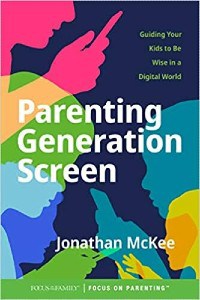
Receive a copy of Parenting Generation Screen and an audio download of this broadcast for your donation of any amount! Plus, receive member-exclusive benefits when you make a recurring gift today. Your monthly support helps families thrive.

Visit our online store and purchase a CD of today's program for yourself or to share with a friend.

Join Focus on the Family's media and culture analysts for insightful reviews and conversation about entertainment, pop culture and technology.
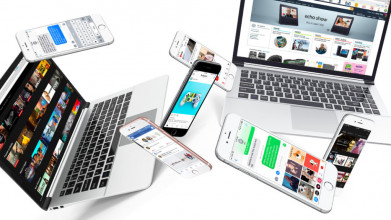
Do you know who your children are interacting with online? Kids won’t learn digital responsibility if we don’t teach them.
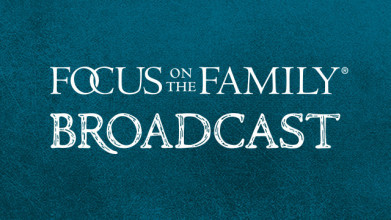
Plugged In media analyst Jonathan McKee provides research-based insights on the impact of the digital world on children and offers parents guidance for setting safe, healthy boundaries for their kids' screen time.

Rules are important, but connecting with your teen is essential.
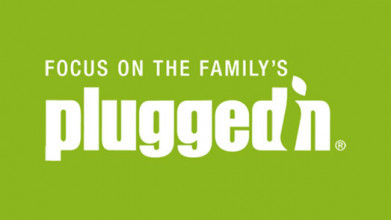
Plugged In shines a light on the world of popular entertainment while giving families the essential tools they need to understand, navigate, and impact the culture in which they live.

Jonathan Mckee has provided numerous tips to help parents properly guide their children when using technology.
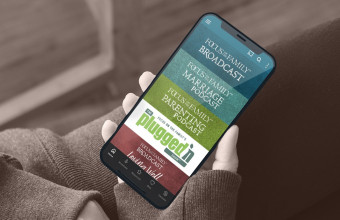
Listen to the Focus on the Family Broadcast, discover more podcasts, and find help for your family at your fingertips.

Focus on the Family's staff of licensed, professional counselors can help you bring healing and restoration to your family with Christian perspectives you can trust.

This discussion offers a preview of Volume #16 “Cultures in Conflict” from the That The World May Know video series, available below.

Debra Fileta will help couples better understand the four seasons of healthy relationships, what to expect during each one, and how to carefully navigate them for a stronger marriage. (Part 1 of 2)
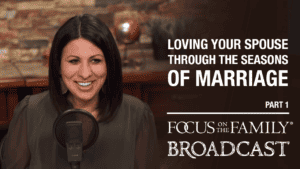
Debra Fileta will help couples better understand the four seasons of healthy relationships, what to expect during each one, and how to carefully navigate them for a stronger marriage. (Part 1 of 2)

Larnelle Harris shares stories about how God redeemed the dysfunctional past of his parents, the many African-American teachers who sacrificed their time and energy to give young men like himself a better future, and how his faithfulness to godly principles gave him greater opportunities and career success than anything else.

Amy Carroll shares how her perfectionism led to her being discontent in her marriage for over a decade, how she learned to find value in who Christ is, not in what she does, and practical ways everyone can accept the messiness of marriage and of life.

Jonathan McKee offers parents practical advice and encouragement in a discussion based on his book If I Had a Parenting Do Over: 7 Vital Changes I’d Make.